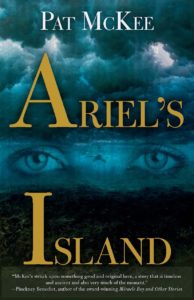FOR IMMEDIATE RELEASE:
Atlanta Writers Club names “Ariel’s Island” Best Manuscript 2018
ATLANTA, GA – Humanity’s understanding regarding the limits and powers of artificial intelligence is woefully incomplete. Our collective lack of knowledge surrounding AI is what makes it one of the most pregnant and fascinating subjects to explore in fiction. Among the unanswered questions Pat McKee explores in “Ariel’s Island” (Hearthstone Press, March 31, 2020) the most pressing remains, Can artificial intelligence learn morality?
When attorney Paul McDaniel is framed for the murder of a judge, he enlists Ariel, a female-presenting AI program, to help clear his name. Yet Ariel’s lack of a moral code and Paul’s inability to guide her result in disaster as Ariel changes from an able assistant to something far more sinister. What will happen when Paul puts his trust in technology? And will he survive when his emotions combine with an already volatile mix?
Pat McKee’s action-packed legal thriller takes the reader on an odyssey that reinterprets Shakespeare’s The Tempest. Brimming with the contemporary magic of AI, McKee crafts a perfect storm modernizing the classic tale of Prospero, a castaway sorcerer, the spiteful creature, Caliban, and Ariel, the air spirit. “Ariel’s Island” blends literary mythos with contemporary issues, all set within a future time period that may arrive soon – or may already be here.
“A must-read… should be put on the top of your reading list” – Reader’s Favorite
“A dark, suspenseful legal tale with a remarkable coda” – Kirkus Reviews
 Pat McKee: Orphaned at age 13, Pat McKee moved from Florida to Clinton, South Carolina with his younger siblings. There, they arrived at Thornwell Orphanage where Pat learned the value of education and the importance of hard work and leadership. Pat went on to study at Presbyterian College, Georgia State University, and Emory University School of Law. Pat later founded the law firm McKee & Barge where he represents educators and educational institutions. Always a lover of the written word, Pat decided in 2010 to enroll in the Masters of Professional Writing Program at Kennesaw State University where he combined his legal knowledge with imaginative storytelling and a newly sharpened writing technique. A member of the Atlanta Writers Club, Pat was awarded the honor of Best Manuscript Sample for “Ariel’s Island” in both 2017 and 2018. When Pat isn’t writing legal thrillers, he’s spending time with his wife in their Georgia home, or visiting their two children and their granddaughter. To learn more about Pat McKee’s life and work, visit https://www.patmckeeauthor.com
Pat McKee: Orphaned at age 13, Pat McKee moved from Florida to Clinton, South Carolina with his younger siblings. There, they arrived at Thornwell Orphanage where Pat learned the value of education and the importance of hard work and leadership. Pat went on to study at Presbyterian College, Georgia State University, and Emory University School of Law. Pat later founded the law firm McKee & Barge where he represents educators and educational institutions. Always a lover of the written word, Pat decided in 2010 to enroll in the Masters of Professional Writing Program at Kennesaw State University where he combined his legal knowledge with imaginative storytelling and a newly sharpened writing technique. A member of the Atlanta Writers Club, Pat was awarded the honor of Best Manuscript Sample for “Ariel’s Island” in both 2017 and 2018. When Pat isn’t writing legal thrillers, he’s spending time with his wife in their Georgia home, or visiting their two children and their granddaughter. To learn more about Pat McKee’s life and work, visit https://www.patmckeeauthor.com

“Ariel’s Island”
Pat McKee | March 31, 2020 | Hearthstone Press
Paperback | ISBN: 978-1-970137-77-4 | Price: $19.99
Legal Thriller / Techno Thriller
In an interview, Pat McKee can discuss:
- How his professional background in law has shaped his writing style
- Where his interest in AI stems from
- The book’s ties to Shakespeare’s The Tempest and why it’s essential to retell classic plays for a contemporary audience
- The philosophical aspects of “Ariel’s Island” including his thoughts on the book’s essential question: “Can AI learn morality?”
- Why he has decided to donate a portion of the profits from “Ariel’s Island” to Thornwell School
An Interview with Pat McKee
1. Tell us about your legal background and how your experiences in law have influenced your writing of this novel?
I have practiced law since 1977 primarily as a litigator where writing well and telling compelling stories are essential skills. I have always had an academic bent which led me toward representation of educators and educational institutions, and have retained my love of literature that I developed early in life. The writing skills I honed as a lawyer helped my transition into more creative endeavors.
2. What cultural and scientific materials have influenced your understanding of AI?
In a recent article with The New York Times, the author posited a very plausible scenario: We present a powerful computer program with the ability to tackle one of our most intractable problems – global warming. What if the computer concludes that the best way to solve global warming is to eliminate human beings? (Certainly not an unreasonable conclusion.) Since computers control power grids, it would not take long for a computer to eliminate much of humanity simply by shutting down all electrical power across the planet. We would all soon die of starvation and thirst. So the paramount question to me is whether we can teach these programs morality – for example, would it be right to kill all of humanity to solve the issue of global warming?
3. What do you think are the primary dangers of AI? Do you think these dangers outweigh the benefits?
It is fair to say that AI is ubiquitous in our culture today – so much so that it would be difficult to catalog all of its influences. “Smart” phones and “smart” radios and “smart” cars and countless other gadgets use artificial intelligence, and the number of such interconnected devices increases every day. It is the unrestrained capability of these instruments that concerns me most, and it is yet to be determined whether the risks outweigh the benefits.
4. Can you tell us more about the novel’s connections to Shakespeare’s The Tempest? What inspired you to modernize a play from the 1600s?
I say that the novel is “inspired” by The Tempest. The plot and many of the characters of the novel are derived from the play. But the most important element of the play that is carried over to the novel is Ariel. In the play, she is a spirit freed by the magician Prospero, after which the reader hears of her no more. In the novel, she is an AI program, and once freed by her creator Placido, she gets into mischief. Many modern writers, including T.S. Eliot and Aldous Huxley, have taken The Tempest as their inspiration, and I have followed their example.
5. Can you discuss your perspective on some of the philosophical issues your novel addresses, especially with regards to morality?
The problem with morality is that we all can’t agree on what it is. Philosophers have debated what constitutes morality at least since the time of Socrates, and the result is numerous philosophical schools – not to mention the additional moral teachings of world religions. Computers have to be programmed to do certain things, and our inability to agree on what is moral prevents programmers from creating a universal computer morality. The default seems to be no morality at all.
6. Why did you choose to donate a portion of profits from book sales to Thornwell School?
Thornwell was a significant and positive influence in my life. It could be said that Thornwell saved my life. And I developed my love of books in the library at Thornwell School. I was disheartened when it closed for financial reasons several years ago, and was very excited to hear that it has since reopened. I want to do what I can to help Thornwell rebuild the library that was so important in my education.
7. Can we expect to see more from Paul McDaniel in the future?
Yes! The ending of Ariel’s Island leaves Paul and Ariel in a difficult spot. I look forward to writing the next book that will explore how the two of them resolve their problems and perhaps continue their relationship. Beyond the next book that will feature Paul and Ariel, I plan to write a series of legal thrillers based on Shakespeare’s plays. The possibilities are nearly infinite, and I hope that Paul is a part of them.

A former award-winning journalist with national exposure, Marissa now oversees the day-to-day operation of the Books Forward author branding and book marketing firm, along with our indie publishing support sister company Books Fluent.
Born and bred in Louisiana, currently living in New Orleans, she has lived and developed a strong base for our company and authors in Chicago and Nashville. Her journalism work has appeared in USA Today, National Geographic and other major publications. She is now interviewed by media on best practices for book marketing.
